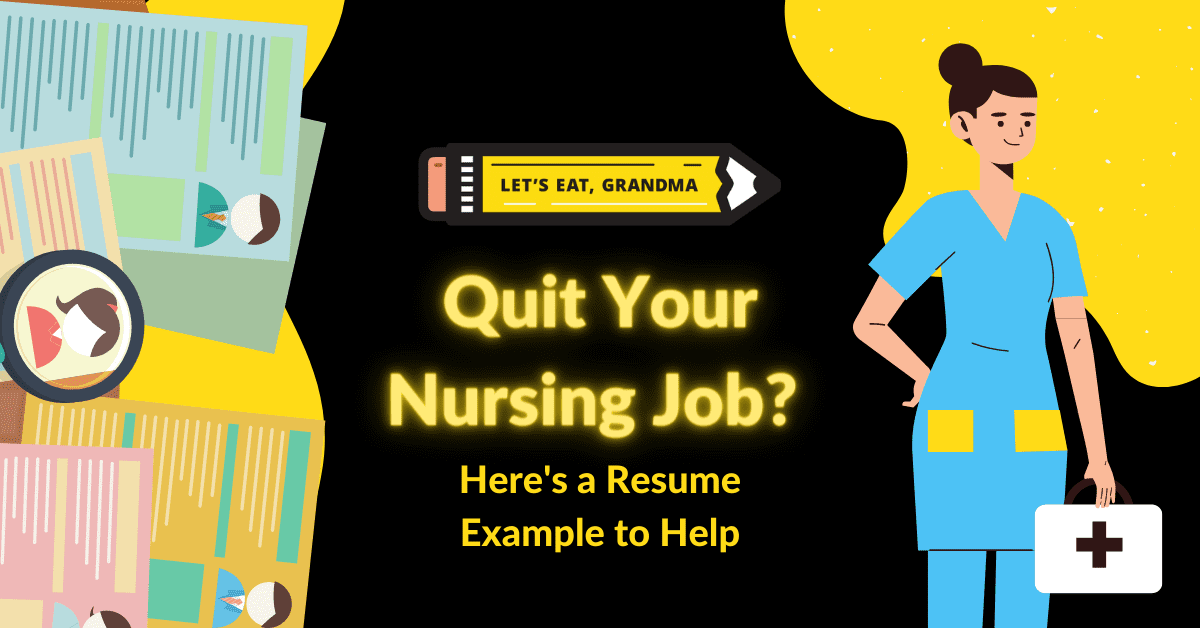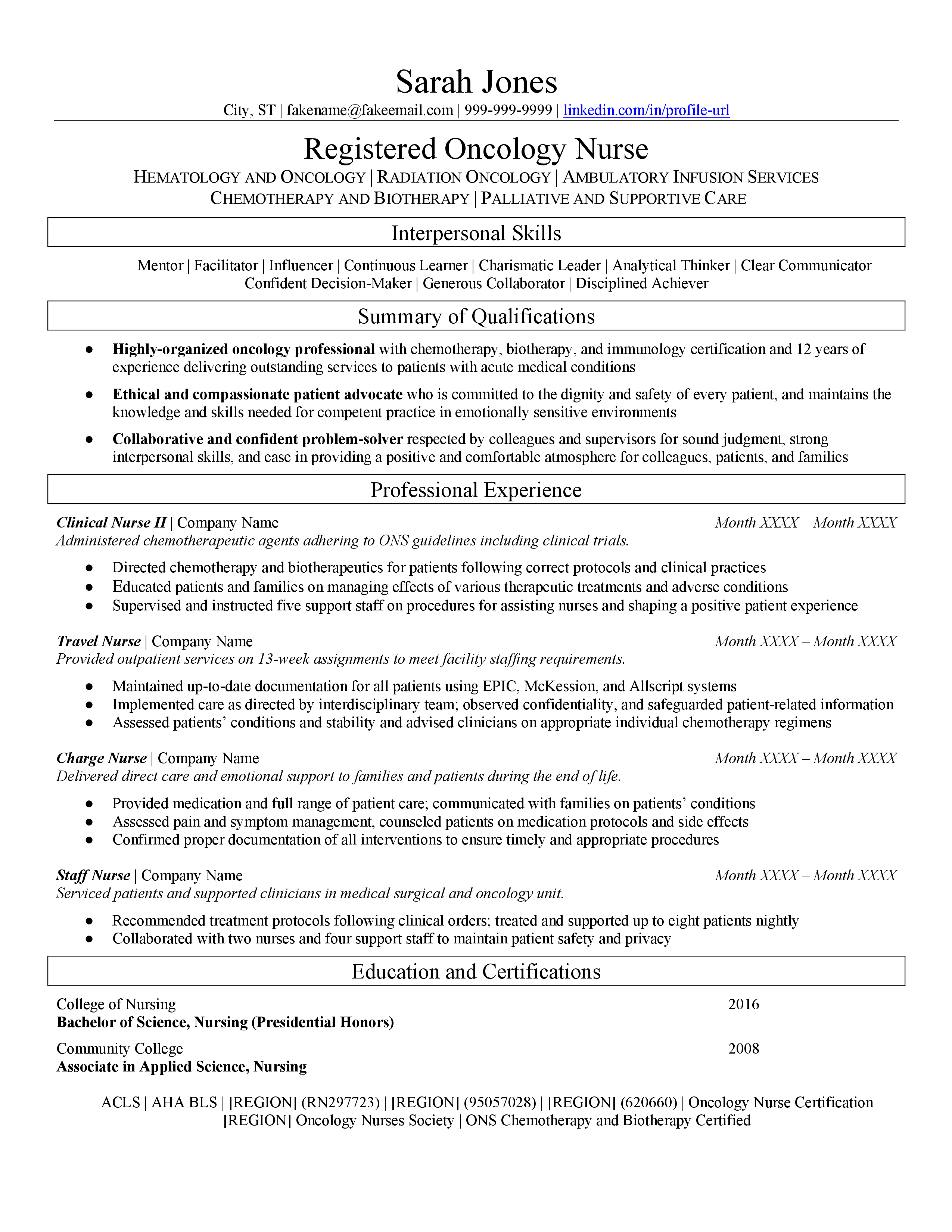Quit Your Nursing Job? Here’s a Nurse Resume Example To Help You.

Health care workers have been under a huge strain over the past couple of years, and nurses are quitting at record rates. If you recently left your job as a nurse, here’s a nurse resume example to get you started on your job search.
By: Shyene Joubert | Contributor for Let’s Eat, Grandma
Hey nurse, or former nurse: It’s time to say hello to 2022, and hello to a new role!
With the Great Resignation not showing any signs of slowing down, perhaps you’re looking for a big change to kick off the new year. There are four industries that have been heavily impacted over the last six months, including nursing.
If you’re a nurse who’s thinking of making a change, whether to a new nursing job or a new career path, we’re here to help. We’re an award-winning resume service, and we’re going to walk you through a nurse resume example we wrote to highlight the main components to focus on when revamping your nursing resume.
Tired of not landing interviews?
Get our free 3-step guide to writing better resume bullet points, featuring 70 ideas for metrics you can use!
Check Out This Nurse Resume Example
Here’s a nurse resume example we wrote for a real resume client. (Their identifying information has been changed.)
Look it over, and then read on for five key best practices we used here that you can use to improve your own nursing resume, plus additional tips on adapting it if you’re changing career paths. (Click here if you want to jump to those!)
Tips for Your Nursing Resume
1. Leave a lasting impression with a robust summary and headline

If you’re one of the many nurses who have left their job recently, this nursing resume example could give you a head start on the job hunt. Photo by Luis Melendez on Unsplash
Think about a first date: It’s important to present your best qualities immediately, right? The same goes for your resume; the content at the top of the document must be specific, thoughtful, and interesting. This includes both your headline and a summary of qualifications.
Headline
Just like a news headline or a DoorDash notification that pops up on your phone, the headline is a brief yet alluring phrase that draws hiring managers in. It should go right below your contact info and before the resume summary.
Using 10 words or less, you want to choose skills or titles that best reflect you as a candidate.
In the nurse resume example above, you will see industry-specific keywords in the headline, such as “Hematology and Oncology” and “Ambulatory Infusion Services.” You might also fill your headline with practices you are proficient in, or you could opt for an alternate route of soft skills if they’re important to the job at hand. For example, “Team Leadership” or “Program Development” are phrases I’ve used for clients in health care roles.
There is no one way to craft a headline – it just needs to speak to your most important attributes as a human and as a nurse.
Summary
The resume summary is a more focused and effective version of the objective section that used to be commonplace on resumes. First, you pinpoint your top three skills as a candidate that are most relevant to the job. Then, you detail how you used each of them in your past positions. Keep in mind the significance of using keywords from each job description to make your resume as visible as possible in the Applicant Tracking System (ATS) and showcase your relevance to this particular job to the recruiter.
Take the second bullet point from the summary on our example resume:
- Ethical and compassionate patient advocate who is committed to the dignity and safety of every patient, and maintains the knowledge and skills needed for competent practice in emotionally sensitive environments
This bullet does double the work by showing both a key interpersonal skill (advocating for patients) and industry-specific skills (ethics and confidentiality). Consider your strengths as a nurse and how you best meet the needs of everyday people.
2. Start Bullet Points with Active Verbs
We’ll say it over and over again: Active verbs are important in writing your resume! While you had duties you were responsible for, no one wants to read that phrase over and over on a job application, especially when recruiters receive an average of 250 applications per posting. Here is a general formula to follow when writing your accomplishment-based bullet points for each relevant role from the last 10-15 years that you’re including on your resume:
Active Verb + Contribution and Skills Used + Result/Metrics
Our sample resume shows this. It doesn’t downplay the job seeker’s leadership qualities by simply stating they were responsible for leading support staff. Instead, the write used an active verb to emphasize how essential the role is:
- Supervised and instructed five support staff on procedures for assisting nurses and shaping a positive patient experience
Now that describes someone I’d want on my team.
(P.S. If you want a deeper look into this formula, download our free eBook on it!)
3. Include Metrics Wherever Possible

Most nurses have more metrics available to include on their resume than they realize. Photo by Jakayla Toney on Unsplash
I have worked with several nursing clients like you, and I hear you when you say it can be difficult to include metrics in your field. Metrics are important, but it can be tough to detail your accomplishments down to the number of people you’ve helped or how many surgeries you’ve assisted on.
However, I find my clients have more metrics in their experience than they initially realize. Below are some questions I ask to jog their memories:
- When you developed Program X, how did you manage the budget? What was the cost reduction percentage from revamping it?
- How long were you in Department X?
- How many direct reports did you manage?
Aha! A lightbulb goes off in their heads.
This nurse resume example contains several metrics in addition to the example mentioned in the last section. For instance, the job description under the travel nurse position says, “Provided outpatient services on 13-week assignments to meet facility staffing requirements.” Giving the reader a specific time period for this accomplishment reflects the candidate’s attention to detail, but it also makes the content easier to understand and more impressive. And, since the eye is drawn to numbers, it also makes the resume easier to read quickly.
Where applicable, be sure to include metrics and results of the work you have done to become even more of a stand-out candidate.
4. Create a Clear Design
We prove to our clients every day that resumes don’t have to sound or look boring. In fact, an easy way to make a resume appear tasteful and skimmable is by using even line spacing and plenty of white space.
Here are some key points to takeaway from the nurse resume example above:
- Avoid large chunks of text beyond the resume summary
- Make sure there is space (3 to 6 pts) between work experience entries as well between body paragraphs and section headings
- Use boxes or lines to frame section headings to make it easier for people to view on the computer
Recruiters and hiring managers can spend very little time reviewing your resume, which is why you have to be conscientious of how much content is on your resume and how it’s presented. Our nurse resume example has a simple, but effective, design that contains key accomplishments that aren’t too crowded, detailed, or hard to read.
For Career Changers: Tips for Transitioning Out of Nursing

A career in nursing develops many transferable skills that you can highlight on your resume if you are transitioning. Photo by Vladimir Fedotov on Unsplash
If you’re changing career paths outside of nursing, you’ll need to adapt this nurse resume example a bit – let’s walk through how to do that.
Resumes are fluid: Just like water changes when it is put into different containers, your resume changes when you’re applying to a different industry. If you quit your nursing job to enter a new career path outside of nursing, you’ll need to adapt your nursing resume to that new industry to show you have the right skills and get hired.
As an example, a client I’m currently collaborating with wondered how to integrate his Tourism & Hotel Management degree into a resume that he’ll use to apply to Software Product Experience positions. I asked him what the top three skills are that he felt made him successful in the former field, and he said leadership, communication, and customer service. These skills are easily transferable to other fields because each ability is essential to working in teams, ensuring everyone is on the same page, and satisfying the needs of clients.
Before working on your resume, take some time to think about the transferable skills you possess that will help you in the new industry you’re targeting. Here is a brief list of transferable skills you might include on your resume:
- Client Advocacy
- Teamwork
- Problem Solving
- Patience
- Compassion
- Organizational Skills
- Time Management Skills
- Recordkeeping
- Data Analysis
How to Adjust This Nursing Resume Example for Your New Career Path
Unlike when you previously applied for nursing jobs, you will want to showcase your transferable qualities (particularly soft skills) in your headline, summary, and work experience bullet points to show how the skills you already have translate to the new industry. Your skills in dealing with difficult patients, for instance, will apply to a customer service job just as much as your nursing job.
Here is a formula for what you should put in the first sentence of your summary if you are transitioning out of nursing:
Adjective + adjective + role with an interest in transitioning # of years of experience in transferable skill + transferable skill + soft skill into new industry.
Here is an example of what that would look like for a nurse transitioning into a training and development job:
“Highly motivated, compassionate nurse with an interest in transitioning 10+ years of experience in building relationships, leading complex teams, and employing problem-solving skills into training and development.”
When revising these areas on your resume to focus on soft and transferable skills, remember the ATS. It’s important to scan the job postings for those keywords I mentioned earlier. Compare job descriptions to your work experience to find all the skills you already know how to do.
What other fields can you enter with a nursing degree?
Not sure about your target career path yet? Nail down that before working on your resume.
If you are looking to transition out of bed-side nursing but aren’t yet sure where to go, here are examples for how nursing skills could transfer to different positions and even different industries (read even more examples here):
Nutritionist
This is a popular field for nurses looking for a change. While many states require a license to practice this, there are most likely a handful of skills you already possess in your arsenal, such as health assessments and nutritional counseling. Patient advocacy, patience, and confidentiality in emotionally sensitive environments are essential skills to have in this role.
Administrative Service Manager
Many nurses end up going into administrative services in the healthcare field because they can apply their skills in delegating responsibilities, recordkeeping, and supervising other team members. This job often requires a bachelor’s degree and relevant work experience, which you definitely have as a nurse!
Medical Records Technician
In this role, not only do you need to have effective written and verbal communication, but it also requires you to understand medical terminology, health data requirements, and coding and classification systems. You can apply your organizational skill and attention to detail here as well.
Customer Service
In your line of work as a nurse, you learned communication and rapport-building skills, which will come in handy in customer service roles. This involves many interpersonal skills because you’re working with the public. The good news is that you thrive in fast-paced environments, handle challenging situations with ease, and easily resolve conflicts.
Training & Development
Positions within this field will require a superior leadership ability to help your team reach short- and long-term goals while improving themselves as professionals. You will want to touch on transferable skills such as mentorship, performance evaluation, collaboration, and project planning. For example, you could explain how you’ve coached direct reports in the past. These will make your nursing experience relevant while showcasing you can apply what you’ve learned in a new role.
Sales
Whether you’re looking at roles in pharmaceutical sales or general sales completely outside of the health care realm, it helps to understand terminology within the specific industry you’re applying to. For the former field, you will already have enough knowledge to speak with doctors via phone or email about medications. You will also utilize active listening and negotiation skills on a regular basis, which you know how to do after having to explain why a patient cannot eat pudding for all three meals.
Put These Tips into Practice on Your Own Nursing Resume
You, along with other health care and emergency services professionals, are the VIPs from the last two years. It’s time you showed that off and got rewarded for that hard work. Follow these best practices to improve your resume and to land that new position!
Ready for more job search help?
Sign up for a free Senior Writer Resume Critique to see what's holding you back from landing interviews. One of our top professional resume writers will give you personalized feedback on the top 3 items you can improve based on our expert practices!

